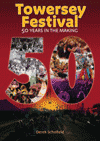
DEREK SCHOFIELD - Towersey Festival: 50 Years In The Making
Mrs. Casey Music Ltd ISBN: 9780954750213
Towersey is a tiny place – almost closer to a hamlet than a village – just a few miles from Thame in Oxfordshire. It had a population in the last census of just 433, and has never in its long history even reached 450 souls. Of all the festivals I used to attend, I am struggling to think of a smaller village. Cropredy for instance has a population of 717...so I think Towersey takes my personal prize here. (Ah, no. I have just thought: I went for many years to Stainsby Folk Festival, and that place is hardly even a hamlet.)
It was 1996 when I last attended a full weekend at Towersey Festival. I went several times from 1980, but alas missed the early years. I have very fond memories of it: excellently run, yet still having that village feel (despite attendance numbers rising exponentially since the first tiny one-day festival back in 1965).
One thing that makes this festival stand out against almost all other folk festivals is the fact that they have studiously avoided ever using the F-word in the title ...i.e. FOLK. Steve Heap, for many years synonymous with the festival, pointed out that the original founders would not call it a folk festival and “restrict its possibilities”. Very brave and far-sighted, I call that. After all, labels are for beer bottles.
That said, most of us who visited it were paid-up members of The Folkies’ Brigade, and we knew we were getting the genuine article. And how well Derek Schofield recalls the artistic highlights we encountered! But first, he goes into great detail on the history of the village and its families.
Now, there are some who might want to skip these introductory chapters and get straight to those later chapters that deal with the nitty-gritty of performance. More fool them if they do: for the way that the author presents the historical facts he has researched is quite compelling, and is the strongest part of the book.
I was fascinated to learn from Derek just how Towersey got its name. It is mentioned in the Domesday Book, when it was known under its Saxon name Eie (meaning island), but was later split in two, King’s Ey and Tours Ey, the latter coming from the family of Richard de Tours. As the author says, “the village became variously Tourseie, Tourseye, Tourfe, Toureye, Toursey, Towerseye and, finally, Towersey”. I salute you Mr Schofield for fascinating stuff like that, and stunning - almost throwaway – sentences like: “In 1862, an eight-year-old boy stabbed the Towersey schoolmistress and was sentenced to two years hard labour”. (It is the “hard labour” bit in that line, that most fascinates me!)
I salute him also for devoting a whole chapter to the founders: the late Denis Manners and late Louis Rushby. So often people who were the driving forces behind festivals get forgotten. (What young person attending, say, Cambridge Folk Festival this century, would recognise the name of Ken Woollard, a local fireman with a vision?)
Interesting to learn that the festival early on, was featuring household names from the world of classical music, like Vilém Tausky and Owen Brannigan. Being the duffer I am, this came as news to me.
Great to see several mentions also in the book of the name of Eric Winter. He was a fine – and occasionally, an engagingly provocative – writer on UK Folk. Someone who was a big influence on so many writers who came along in his wake, and was a big supporter of this festival.
Too many names of star performers down the years for me to mention here in this review, but trust me, the author misses nobody of note in a very detailed account of the various high spots. And backs it up with superb photographs and a very sound and comprehensive index.
And he gives proper prominence to the dance displays in the Arena: I have never been a dance man, but those August Bank Holiday Saturday afternoon shows always engrossed me. I made sure to get to my seat early, high up on the terraced seating: and the sheer sense of theatre in the arrival of the procession of the dancers, was truly exciting to behold.
(Incidentally, proof that there was never a chance of my ever becoming a devotee of John Playford can be gleaned from the fact that it was a first for me to learn that Steve Heap borrowed the name of Mrs Casey Music back in 1972, from the name of a familiar morris dance. Good stuff, Derek.)
Now I am sure that Derek Schofield does not want me to do the proverbial blowing of smoke in this review, so in the interests of artistic balance, I feverishly looked for something to hit him over the head with. And guess what? I couldn’t...apart from this bit of nit-picking from me, viz. he talks of Jez Lowe in his “trademark stripey t-shirts”. Technically, of course, the author was right. It is stripey. But horizontally so. And 99 people out of a hundred would call such stripes “hoops”: reserving the word stripey for the vertical. And as Derek is a wordsmith, I am sure he will happily take my pathetic punch on his chin! I mean to say, try telling Glasgow Celtic fans that their team plays in stripes!
Sooner you than me. I’d prefer to keep my head down, engrossed in this fine book instead.
Dai Woosnam
| Buy
this CD online from The Listening Post The Listening Post is the CD mailorder service of The Living Tradition magazine. This album was reviewed in Issue 111 of The Living Tradition magazine. |

